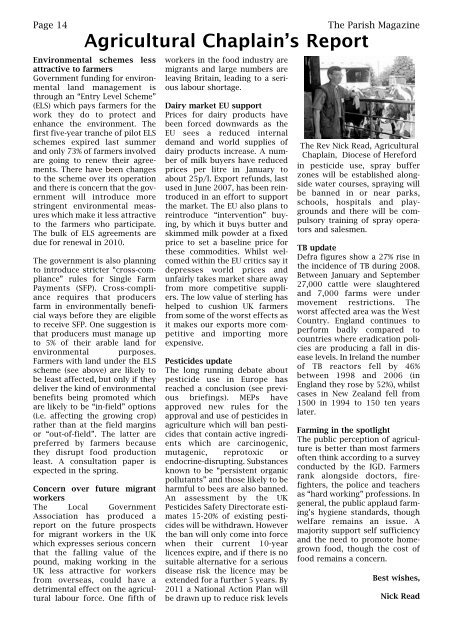Click - Parish of Greater Whitbourne
Click - Parish of Greater Whitbourne
Click - Parish of Greater Whitbourne
You also want an ePaper? Increase the reach of your titles
YUMPU automatically turns print PDFs into web optimized ePapers that Google loves.
Page 14Agricultural Chaplain’s ReportEnvironmental schemes lessattractive to farmersGovernment funding for environmentalland management isthrough an “Entry Level Scheme”(ELS) which pays farmers for thework they do to protect andenhance the environment. Thefirst five-year tranche <strong>of</strong> pilot ELSschemes expired last summerand only 73% <strong>of</strong> farmers involvedare going to renew their agreements.There have been changesto the scheme over its operationand there is concern that the governmentwill introduce morestringent environmental measureswhich make it less attractiveto the farmers who participate.The bulk <strong>of</strong> ELS agreements aredue for renewal in 2010.The government is also planningto introduce stricter “cross-compliance”rules for Single FarmPayments (SFP). Cross-compliancerequires that producersfarm in environmentally beneficialways before they are eligibleto receive SFP. One suggestion isthat producers must manage upto 5% <strong>of</strong> their arable land forenvironmental purposes.Farmers with land under the ELSscheme (see above) are likely tobe least affected, but only if theydeliver the kind <strong>of</strong> environmentalbenefits being promoted whichare likely to be “in-field” options(i.e. affecting the growing crop)rather than at the field marginsor “out-<strong>of</strong>-field”. The latter arepreferred by farmers becausethey disrupt food productionleast. A consultation paper isexpected in the spring.Concern over future migrantworkersThe Local GovernmentAssociation has produced areport on the future prospectsfor migrant workers in the UKwhich expresses serious concernthat the falling value <strong>of</strong> thepound, making working in theUK less attractive for workersfrom overseas, could have adetrimental effect on the agriculturallabour force. One fifth <strong>of</strong>workers in the food industry aremigrants and large numbers areleaving Britain, leading to a seriouslabour shortage.Dairy market EU supportPrices for dairy products havebeen forced downwards as theEU sees a reduced internaldemand and world supplies <strong>of</strong>dairy products increase. A number<strong>of</strong> milk buyers have reducedprices per litre in January toabout 25p/l. Export refunds, lastused in June 2007, has been reintroducedin an effort to supportthe market. The EU also plans toreintroduce “intervention” buying,by which it buys butter andskimmed milk powder at a fixedprice to set a baseline price forthese commodities. Whilst welcomedwithin the EU critics say itdepresses world prices andunfairly takes market share awayfrom more competitive suppliers.The low value <strong>of</strong> sterling hashelped to cushion UK farmersfrom some <strong>of</strong> the worst effects asit makes our exports more competitiveand importing moreexpensive.Pesticides updateThe long running debate aboutpesticide use in Europe hasreached a conclusion (see previousbriefings). MEPs haveapproved new rules for theapproval and use <strong>of</strong> pesticides inagriculture which will ban pesticidesthat contain active ingredientswhich are carcinogenic,mutagenic, reprotoxic orendocrine-disrupting. Substancesknown to be “persistent organicpollutants” and those likely to beharmful to bees are also banned.An assessment by the UKPesticides Safety Directorate estimates15-20% <strong>of</strong> existing pesticideswill be withdrawn. Howeverthe ban will only come into forcewhen their current 10-yearlicences expire, and if there is nosuitable alternative for a seriousdisease risk the licence may beextended for a further 5 years. By2011 a National Action Plan willbe drawn up to reduce risk levelsThe <strong>Parish</strong> MagazineThe Rev Nick Read, AgriculturalChaplain, Diocese <strong>of</strong> Herefordin pesticide use, spray bufferzones will be established alongsidewater courses, spraying willbe banned in or near parks,schools, hospitals and playgroundsand there will be compulsorytraining <strong>of</strong> spray operatorsand salesmen.TB updateDefra figures show a 27% rise inthe incidence <strong>of</strong> TB during 2008.Between January and September27,000 cattle were slaughteredand 7,000 farms were undermovement restrictions. Theworst affected area was the WestCountry. England continues toperform badly compared tocountries where eradication policiesare producing a fall in diseaselevels. In Ireland the number<strong>of</strong> TB reactors fell by 46%between 1998 and 2006 (inEngland they rose by 52%), whilstcases in New Zealand fell from1500 in 1994 to 150 ten yearslater.Farming in the spotlightThe public perception <strong>of</strong> agricultureis better than most farmers<strong>of</strong>ten think according to a surveyconducted by the IGD. Farmersrank alongside doctors, firefighters,the police and teachersas “hard working” pr<strong>of</strong>essions. Ingeneral, the public applaud farming’shygiene standards, thoughwelfare remains an issue. Amajority support self sufficiencyand the need to promote homegrownfood, though the cost <strong>of</strong>food remains a concern.Best wishes,Nick Read
















